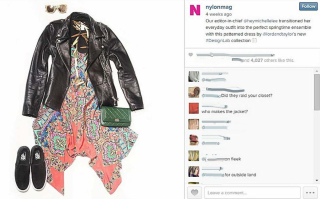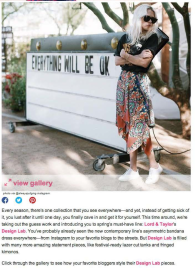Lord & Taylor Gets Slap On Wrist For Paying Instagram “Influencers” To Run Secret Ads
If you’re getting paid to chat up a product or brand on social media, you need to disclose your relationship with what you’re shilling. That’s why retailer Lord & Taylor ended up in hot water with the Federal Trade Commission after paying high-profile Instagram accounts to secretly market their clothing without revealing that these were just ads.
In a complaint [PDF], the FTC says that, to promote the retailer’s Design Lab line, Lord & Taylor sent out 50 free dresses to “select fashion influencers” who were then paid anywhere from $1,000 to $4,000 to post photos of themselves wearing the dress on Instagram during a two-day period in March 2015.
The FTC says that while these social media influencers were instructed how to reference the dress in their posts, “the contracts did not require the influencers to disclose in their postings that [Lord & Taylor] had compensated them.”
Even if leaving that requirement out of the contract was an innocent mistake, the complaint notes that Lord & Taylor reviewed the text and photos for each of the 50 Instagram posts before they were published, and while the retailer edited the text of some posts, the FTC says that not a single one of the 50 items included an advertising disclosure and Lord & Taylor never attempted to add this clarification.
Some 11.4 million people saw these posts, and the dress being advertised sold out at Lord & Taylor.
But the under-the-radar campaign wasn’t just on Instagram. The retailer also edited and published “articles” in popular online publications like Nylon.
In addition to running a paid, but undisclosed, ad for the dress on the Nylon Instagram account, the Nylon site subsequently ran a full gallery of L&T Design Lab clothing, written and edited by the retailer, but without being labeled as an advertisement.
Deliberately failing to disclose that a social media post — or an apparent piece of editorial content — is in fact a paid ad would be a violation of the FTC Act’s prohibition against deceptive or unfair business practices.
Today, the FTC announced it had reached a settlement [PDF] with Lord & Taylor, barring the retailer from misrepresenting that paid ads are from an independent source, and requiring L&T to ensure that its influencers clearly disclose when they have been compensated in exchange for their endorsements.
“Lord & Taylor needs to be straight with consumers in its online marketing campaigns,” said Jessica Rich, Director of the FTC’s Bureau of Consumer Protection. “Consumers have the right to know when they’re looking at paid advertising.”
UPDATE: Lord & Taylor has provided the following emailed statement to Consumerist regarding today’s settlement announcement:
“Lord & Taylor is deeply committed to our customers and we never sought to deceive them in any way, nor would we ever. In the FTC’s consent order announced today, there is no finding of wrongdoing whatsoever. A year ago, when it came to our attention that there were potential issues with how the influencers posted about a dress in this campaign, we took immediate action with the social media agencies that were supporting us on it to ensure that clear disclosures were made. We cooperated fully with the FTC’s inquiry into the marketing of this dress and have of course agreed to uphold the current version of the guidelines. The FTC has changed its guidelines since last year and we applaud the new guidelines that clarify the rules. Further, we encourage the FTC to continue to update and communicate their guidelines clearly and swiftly as the digital and social media landscape rapidly evolves. We remain dedicated to our core values of transparency and honesty in everything that we do for our customers.”
Want more consumer news? Visit our parent organization, Consumer Reports, for the latest on scams, recalls, and other consumer issues.



